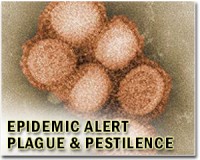| . |  |
. |
Vienna (AFP) July 18, 2010 A major expert panel recommended ahead of the start of the world AIDS conference here Sunday that patients with HIV start antiretroviral drugs at an earlier stage of infection. Earlier initiation of the famous combination of drugs that repress the human immunodeficiency virus (HIV) can reduce long-term mortality and sickness, the group said. It set out its recommendations in a paper published by the Journal of the American Medical Association (JAMA) and presented in Vienna just before the six-day 18th International AIDS Conference got underway. The group suggested that infected individuals be treated when their count of CD4 cells -- the key immune cells targeted by HIV -- reaches a threshold of 500 CD4 cells per microlitre of blood or below. Therapy "should be considered" for non-symptomatic patients with more than 500 cells per microlitre, it said, adding: "There is no CD4 cell count threshold at which initiating therapy is contra-indicated," or inadvisable. Therapy is also recommended for patients who are pregnant, older than 60, are co-infected by hepatitis B or C and at high risk for cardiovascular disease. The CD4 count is the one of major barometers of infection by HIV. A healthy, uninfected person has a CD4 count of between 1,000 and 1,500 cells per microlitre. Under UN guidelines, treatment is advised when infection is somewhat more severe, at 350 CD4 cells per microlitre. Changes in guidelines have consequences that reach into many spheres. Treating people sooner than before means boosting the drugs bill at a time of widening austerity. It also requires having the infrastructure in place -- doctors, nurses and labs -- to ensure the therapy is being properly followed and the patient is responding to treatment. In practical terms, the guidelines will be most relevant in rich countries with the drug budgets and medical infrastructure to treat people earlier, the authors said. "We tried to stick with the data that were available and to make the best scientific recommendations... (but) they are intended for more highly-resourced countries," said lead investigator Melanie Thompson of the AIDS Research Consortium of Atlanta and chairwoman of the US branch of the International AIDS Society (IAS). The panel looked at the latest investigations into the benefits of earlier treatment, weighed against the risks of side effects from antiretrovirals, a powerful drug that has to be taken daily for the rest of a patient's life. These probes showed that HIV, by replicating unchallenged in the blood, had long-term implications for sickness and the death rate. In addition, new antiretrovirals have come to the fore that have fewer side effects and are well-suited for initiating therapy, the paper said. International guidelines set down in 2006 by the UN's World Health Organisation (WHO) advised doctors to begin therapy when the patient's count of CD4 cells reaches 200 cells or less per microlitre of blood. This figure was raised by the WHO last year to 350 CD4 cells per microlitre of blood. Thompson said the WHO recommendations were not a factor in the panel's debate. She also wondered whether the WHO had to factor in the need to offer advice that understood the reality in cash-strapped countries with high prevalence of HIV. Antiretrovirals can reduce levels of HIV to below detectable levels, but cannot eradicate the pathogen completely. The microbe holes up in a small number of cells and leaps out again if the drugs are stopped. More than 33 million people have AIDS or HIV, according to UN estimates for the end of 2008. At least 25 million have died of acquired immune deficiency syndrome (AIDS) since the disease first came to light in 1981.
Share This Article With Planet Earth
Related Links Epidemics on Earth - Bird Flu, HIV/AIDS, Ebola
 Global economic crisis threatens fight against AIDS
Global economic crisis threatens fight against AIDSWashington (AFP) July 17, 2010 The global fight against HIV/AIDS is threatened by stagnating economies around the world, which have caused governments to shrink their budgets and, with them, grants to fight the illness. "We are facing a major challenge in terms of funding because the global economic downturn has got a lot of governments looking hard at their budgets, and some doing decreases in the kind of aid that goes f ... read more |
|
| The content herein, unless otherwise known to be public domain, are Copyright 1995-2010 - SpaceDaily. AFP and UPI Wire Stories are copyright Agence France-Presse and United Press International. ESA Portal Reports are copyright European Space Agency. All NASA sourced material is public domain. Additional copyrights may apply in whole or part to other bona fide parties. Advertising does not imply endorsement,agreement or approval of any opinions, statements or information provided by SpaceDaily on any Web page published or hosted by SpaceDaily. Privacy Statement |